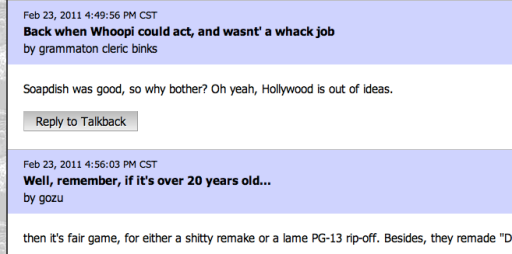
I always cringe a little when I hear people say anything to effect of “Hollywood has run out of ideas” or “there’s no originality in Hollywood anymore.” Not just because they’re lazy criticisms typically uttered with disdain, detachment, and smugness (and by someone who acts like they’re the first person to say it), but because it’s not even true. The film industry has never been about original ideas, and that’s not necessarily a bad thing.
The main formula of “Hollywood” has always been 4 parts something familiar plus 1 part something different (to give you a reason to pay for it again). That’s the way it’s been for over a century.
Case in point: 1939
When I first started writing this blog post, I wanted to examine “the greatest year in the history of American cinema.” Two years kept coming up over and over again in my searches. The first is 1939, because a startling number of films produced that year have truly stood the test of time. Here are the ten movies nominated for Best Picture at the Academy Awards that year: Gone with the Wind – Stagecoach – Wuthering Heights – Dark Victory – Love Affair – Goodbye, Mr. Chips – Ninotchka – Mr. Smith Goes to Washington – Of Mice and Men – and The Wizard of Oz.
Though Dark Victory (with Bette Davis, Bogart, and Reagan) and Ninotchka (a Lubitsch/Billy Wilder collaboration) have failed to leave an indilible mark on the cinematic consciousness of America, the others easily rank amongst all-time classics — movies that are constantly referenced as high points of their genre.
Now, you might say: “Exactly, Hollywood has tried to imitate those eight other films to death! So I’m right. Hollywood is unoriginal.”
Except, of course, for the fact there’s a stunning dearth of “originality” on that list.
1. Gone with the Wind – based on a novel.
2. Stagecoach – Both a genre film and an adaptation of a short story “The Stage to Lordsburg”
3. Wuthering Heights – Novel.
4. Dark Victory – Based on a play.
5. Love Affair – Look, an original story for the screen!
6. Goodbye, Mr. Chips – Novel (though it should be noted this movie wasn’t made by “Hollywood” — it’s British)
7. Ninotchka – An original screen story.
8. Mr. Smith Goes to Washington – Based on an unpublished story.
9. Of Mice and Men – Novel.
10. The Wizard of Oz – Novel.
So of the best picture nominees from one of the most historical years in movies, 8 were adaptions of preexisting material. But you know what? I’ll knock it down to 7, since the original story for Mr. Smith was never published. So there you go. 7 out of 10, and no one has ever called Gone With The Wind or The Wizard of Oz unnecessary adaptations. And as for Love Affair… It may be a classic, and it may be original, but you know what’s considered even more of a classic? The 1957 remake: An Affair to Remember.
Also noteworthy about Love Affair, its success led to two more films starring the same leads (Irene Dunne and Charles Boyer) being produced soon thereafter. Hollywood did that a lot in the pre-home video era. To satisfy the audience’s desire to see certain actors together again, when they couldn’t make a sequel they’d just pair them up again and again in other (very similar) films. In other words, the golden age of movies was filled with a lot more You’ve Got Mail’s than Sleepless in Seattle‘s.
If Hollywood had as much of a habit of doing that today as they did back then, what would the internet call them? Faux-quels?
And what’s the other “greatest year of cinema” that kept coming up? 1946.
That’s the year more Americans went to the movies than any other year. Film would never again be as dominant a past time as it was that year (in terms of overall attendance). And what were people going to see? Here are the top ten movies of that year (per the American box office-wise)….
1. The Best Years of Our Lives, based on a novel.
2. Duel in the Sun, “suggested” by a novel.
3. Till the Clouds Roll By, an MGM musical made of popular songs from other films and broadway productions (it was a “best of” showcase dedicated to the work of composer Jerome Kern)
4. The Yearling, based on a novel.
5. Beauty and The Beast, not the first time this story was told and definitely not the last.
6. Tomorrow is Forever, an original screen story
7. Humoresque, based on a published short story
8. The Jolson Story, not the first biopic of Al Jolson, that’s for sure.
9. Black Angel, based on a novel.
10. The Dark Mirror, appears to be based on material generated just for the film.
Final score: Originality 2, Unoriginality 8.
And that’s just the top 10. When I first started writing this, I intended to go through every movie produced by the American studio system in 1946. Using the IMDb’s “MOVIEmeter” (which ranks the popularity of titles today), I started at the top and worked my way down. I got through the first 20 before giving up because there was just one — one! — truly original film story among them. Four of the first 20 were, in fact, remakes (Notorious, Postman Always Rings Twice, My Darling Clementine, and Easy to Wed).
That sole truly original movie? It’s a Wonderful Life (which, interestingly, didn’t even crack the top 50 from the 1946 box office).
Now, I’m not saying that originality isn’t something to strive for. Of course it is. I’m just saying that source material isn’t the only avenue of originality in movies. In fact, because film is a vibrant medium one could argue that truly original execution is even more important than a truly original premise (especially since one could easily argue there are no truly original premises anymore).
Also, for a movie to get made, so many elements have to line up. The studio execs, the financiers, the director, the writer, the producers, and the star all have to be on the same page before a greenlight is given. Because of that, adaptions of anything will always be the norm because it gives everyone a reference point. Even in the independent sphere this is true. Would Mike Birbiglia have been able to get his movie “Sleepwalk With Me” made if it didn’t already exist as a theatrical production and a popular NPR piece?
And as for why movies seem to be remade more often now than ever — that’s simple. It’s only natural that as the libraries of film studios grew, they’d look less to books and novels and plays and more to the properties they already own. But the process is the same as it ever was. And it’s not like the same scripts are being shot over and over again. New writers with new ideas are always brought in. Every remake begins with the same question: “What can we do differently this time, to make it our own?”
Another problem with the “Hollywood has run out of originality” criticism is how narrowly it defines “Hollywood” (a word that has almost no meaning these days, but that’s another post). Yes, there are fewer movies being made, which probably means that sequels, remakes, and adaptions make up a larger percentage of all movies released in theaters. But Hollywood studios no longer make just movies. We’ve got more scripted TV than ever — and the vast majority of TV shows AREN’T adaptations of anything. On an hour-per-hour basis, there’s more “original” content than ever before.
TV is also prime example of how an original idea doesn’t necessarily mean a original product. How many shows are there with completely different premises, yet when you watch them, you feel like you’re watching the same exact thing?
Anyways, I’ve already said about two thousand words more on this topic than I intended. All I ask is that the next time you hear someone say “Hollywood has run out of ideas,” just remember that people have been saying the same exact thing for decades… You might want to ask them to come up with something new to say.

Pingback: Searching for John Connor… | buchnotes
Pingback: '90s Reboots like Full House, Coach, X-Files are a Good Thing | Digital Trends
Sorry but youre a damn fool. EVERY show/movie is about the SAME thing. 30 thousand zombie shows is proof they have run out of ideas. Making a star wars movie 8 million years after the first and calling IT the first when you never said that 8 million years ago is more proof. If you watch tv YOU are lazy and brain dead. Read a book. Clearly hollywood is out of ideas. If i line up 20 people and have them strip and bend over its 20 visuals of the exact same thing. All ass. I only need to show you one ass to make my.point . Not 20. So if tv/movies are showing the SAME things in many different ways CLEARLY they are out of ideas. But tv was created by smart people for stupid people. And man are they banking. For the record, oprah,bill gates etc are not sitting around watching tv. They are banking off of the idiots who do
.